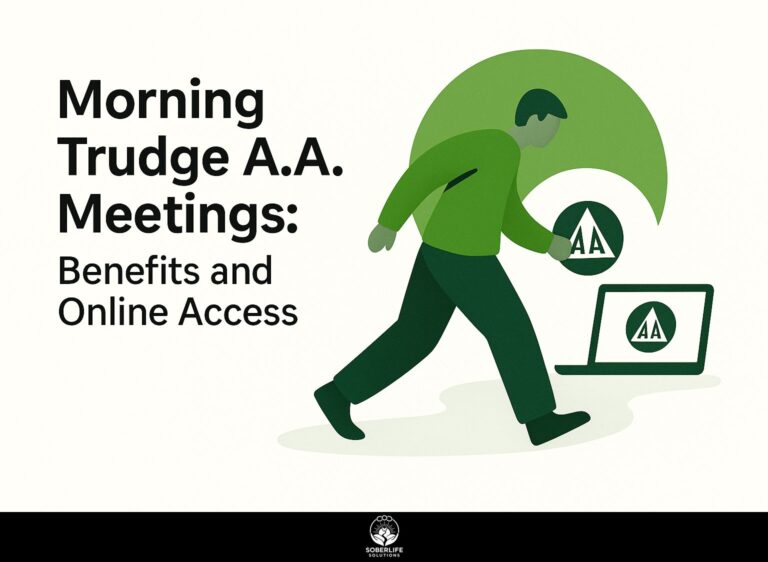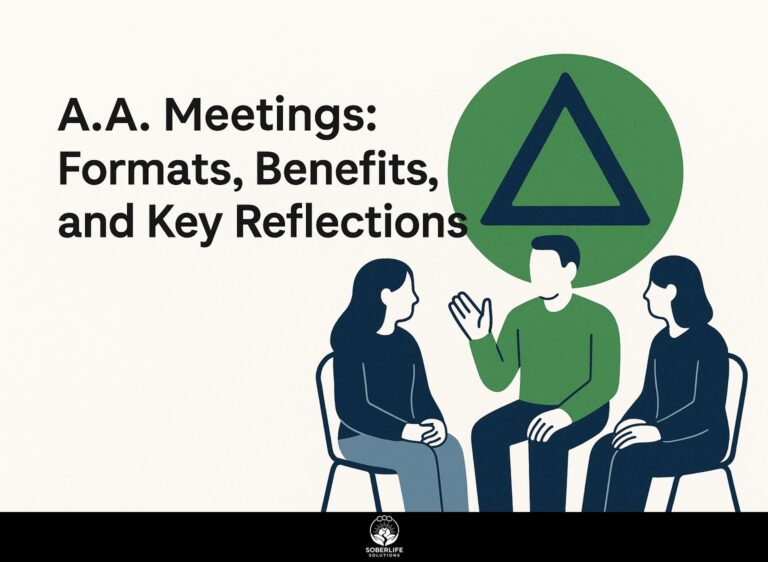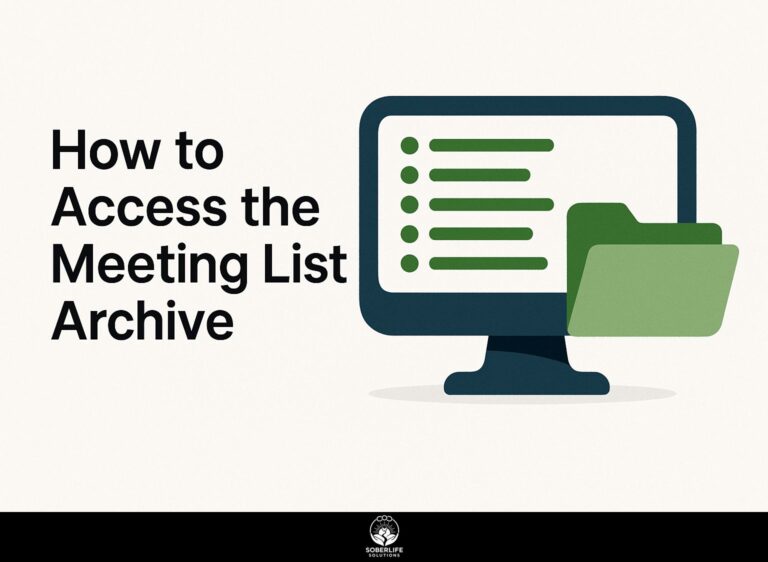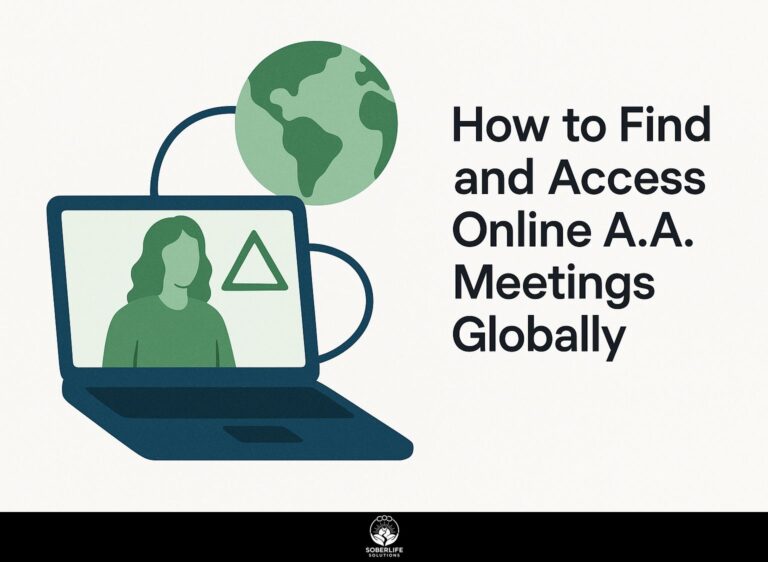Finding A.A. Meetings with Flexible Scheduling: Resource Guide
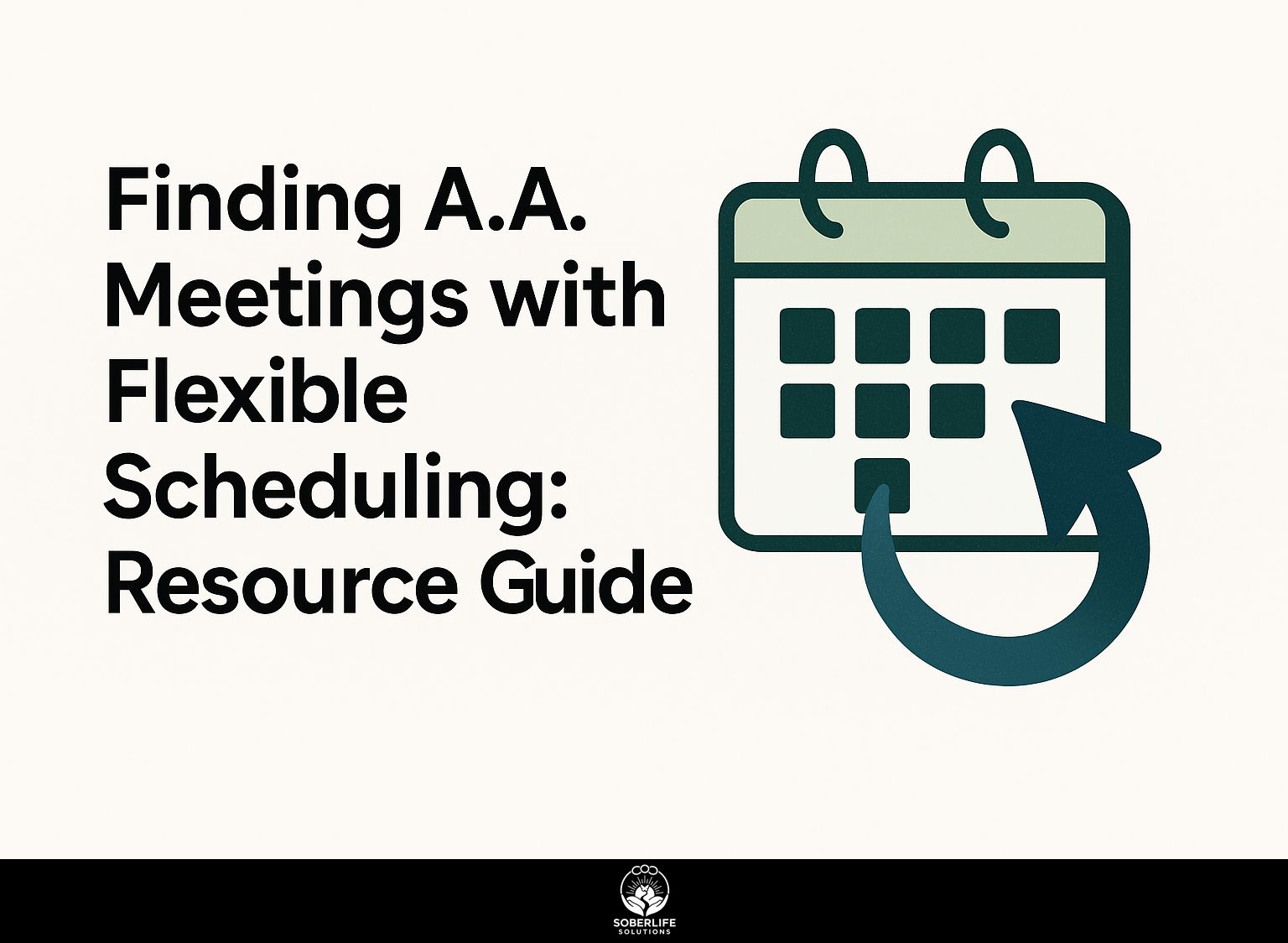
Struggling to find A.A. meetings that fit your busy schedule? This Meeting Guide is your essential resource for locating both local and online meetings that accommodate your needs. With the help of Alcoholics Anonymous and guidance from the Big Book AA, you’ll find various pathways that make recovery possible. Read on to understand how to handle different meeting types and get the help you need, no matter your schedule.
Key Takeaways:
What is Alcoholics Anonymous?
Founded in 1935, Alcoholics Anonymous is a fellowship of individuals sharing their experiences, strength, and hope to help each other recover from alcohol addiction.
Central to AA’s approach are the Big Book, which outlines the program’s principles, and the Twelve Steps, a structured guideline for personal recovery.
The Big Book offers thorough descriptions of recovery stories and the program’s ideas, helping members by sharing personal experiences. Each action encourages care and accountability, forming a supportive environment for progress.
Worldwide, AA holds more than 120,000 meetings each year, with a reported success rate of about 33%. This extensive network helps people locate nearby help, increasing their chances of recovering successfully. As detailed by Wikipedia, the organization provides a robust framework that supports individuals in their pursuit of sobriety (explored further in our guide on Alcoholics Anonymous Anonymity).
Importance of Flexible Scheduling
Flexible scheduling significantly increases attendance rates, with studies showing that 70% of participants prefer meetings that accommodate their lifestyle, such as virtual and hybrid options. Recent research published in ResearchGate indicates a positive impact on engagement when flexible scheduling is implemented.
To increase participation, try using tools like Doodle for scheduling in various time zones. This lets participants choose the times that work best for them.
Implementing a hybrid format can cater to those who prefer in-person interactions while still including remote participants.
Be mindful of time zone differences; for instance, a meeting set for 2 PM EST may be inconvenient for those in PST, so rotating meeting times can offer fairness.
Following these steps can create a more friendly environment and encourage participation.
Types of A.A. Meetings
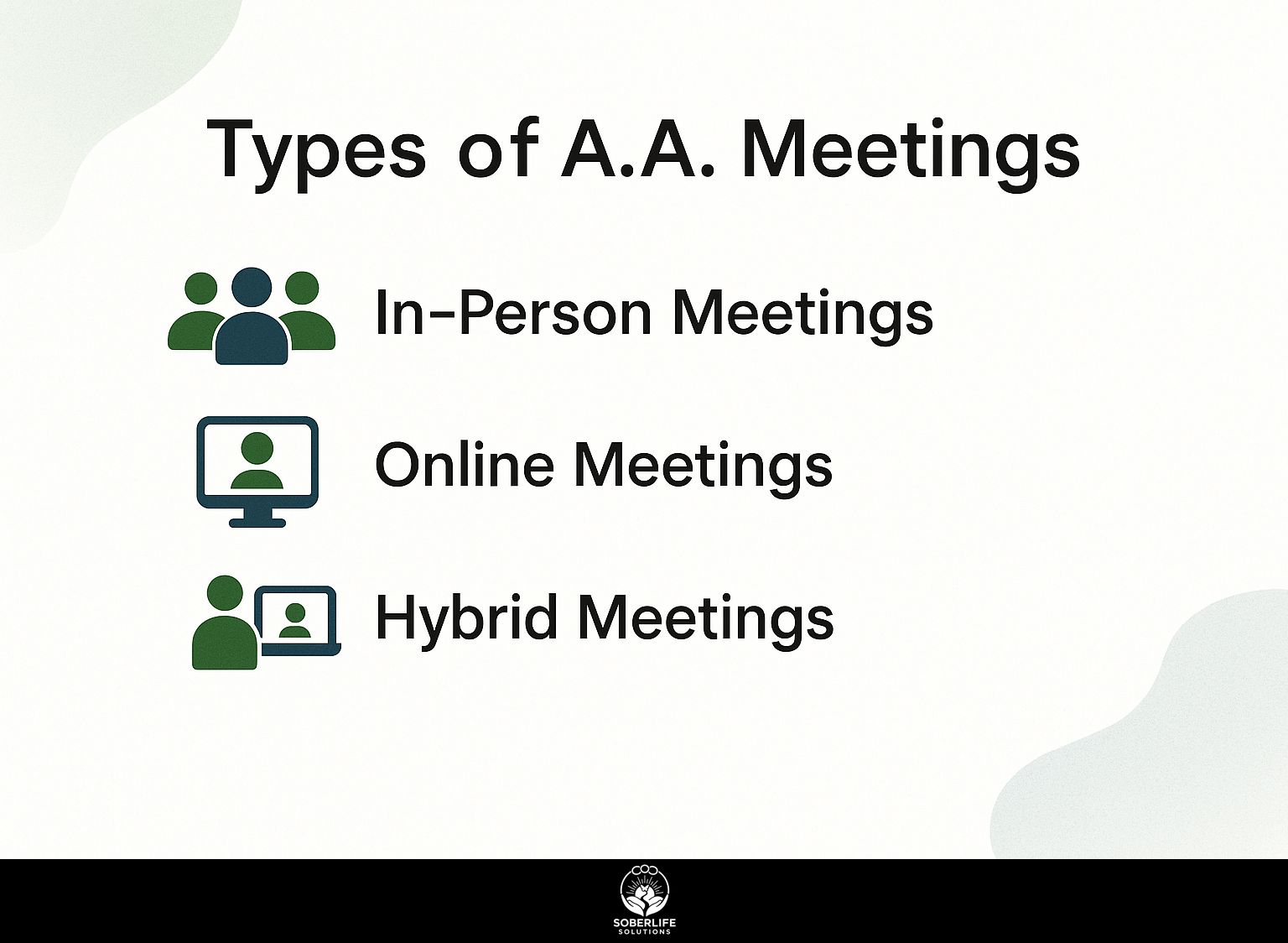
A.A. offers various meetings so everyone can find a supportive environment that suits their personal preferences and recovery objectives. Learn more: Understanding the types, benefits, and tips for attending A.A. meetings can enhance this journey.
In-Person Meetings
Meeting in person is still very important for A.A. It allows members to interact directly, helping them build stronger bonds and stay responsible.
These meetings provide many benefits, like community support and quick feedback. Members can share personal experiences, which often leads to stronger bonds and encouragement.
To locate local meeting schedules, visit AA.org or check intergroup websites where you can find details about times, locations, and formats of meetings.
By attending regularly, individuals strengthen their commitment to staying sober and build lasting relationships with others who share their experiences.
Online Meetings
Online meetings have surged in popularity, especially during the pandemic, allowing individuals to connect from anywhere and meet their recovery goals without geographical constraints.
These meetings provide significant benefits, particularly for those facing mobility challenges.
Platforms like Zoom, Microsoft Teams, and Google Meet allow video calls and make it easy to share resources using built-in tools for screen sharing and working together on documents. For example, a Zoom session can include a shared presentation that all participants can view in real-time, enhancing engagement.
This method makes it easier for people to join and provides a chance for quick feedback and conversation among participants, which helps create a team-oriented setting important for recovery support. For those aiming to optimize their virtual meetings, Harvard Business Review offers insightful strategies to lead more effective and engaging sessions.
Hybrid Meetings
Hybrid meetings blend in-person and online formats, providing flexibility and inclusivity for those who prefer participating in different ways.
To set up a successful hybrid meeting, make sure you have a dependable video conferencing tool like Zoom or Microsoft Teams. Use quality microphones and cameras to capture both in-room and virtual participants clearly.
Consider sharing an agenda and digital tools such as shared documents or polling software to encourage engagement throughout the meeting.
To involve remote participants, use breakout rooms for discussions and regularly request their input, ensuring everyone gets a chance to talk. This method promotes collaboration and improves the meeting experience for all attendees.
Finding Meetings with Flexible Times
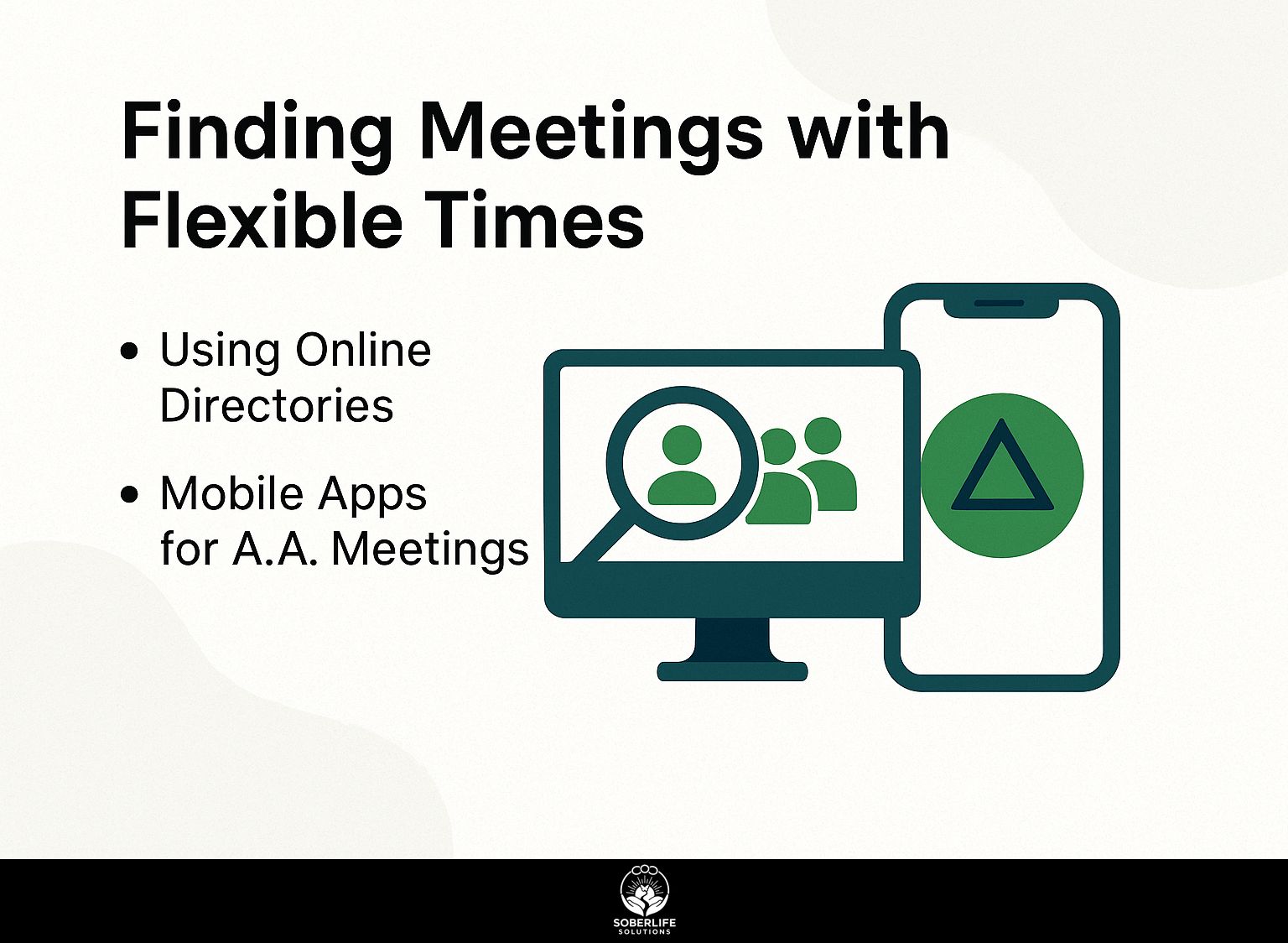
It’s now simpler to find A.A. meetings that suit busy schedules, thanks to different online resources and mobile apps.
To make the most out of these tools, you might consider utilizing the search and filter options available in many online directories, such as the A.A. Online Meeting Directory. This resource offers practical methods to refine your search and efficiently locate meetings that fit your timetable.
Using Online Directories
Websites like AA.org and local group pages list all A.A. meetings. Users can sort the list by time, place, and meeting type.
To find meetings near you, go to AA.org and enter your zip code.
Use the filtering options to choose certain times, like evenings or weekends. Another useful tip is to regularly check local intergroup pages for updates or changes in meeting schedules.
Many of these pages offer downloadable calendars or contact information for local coordinators, ensuring you have the most current meeting details at your fingertips.
Mobile Apps for A.A. Meetings
Mobile applications such as the ‘Meeting Guide’ app facilitate quick access to A.A. meetings, often featuring real-time updates and meeting links.
Another popular app is ‘Sober Tool,’ which provides a daily motivational quote along with a meeting locator. Users can easily track their sobriety progress and connect with others through the community feature.
The ‘AA Big Book’ app gives instant access to the literature, allowing members to read the text on-the-go.
Lastly, ‘iAmSober’ focuses on building daily accountability with features like streak tracking and goal setting.
These apps improve the recovery process by providing easy access to resources and encouraging continued involvement with the A.A. community.
Tips for Attending Meetings
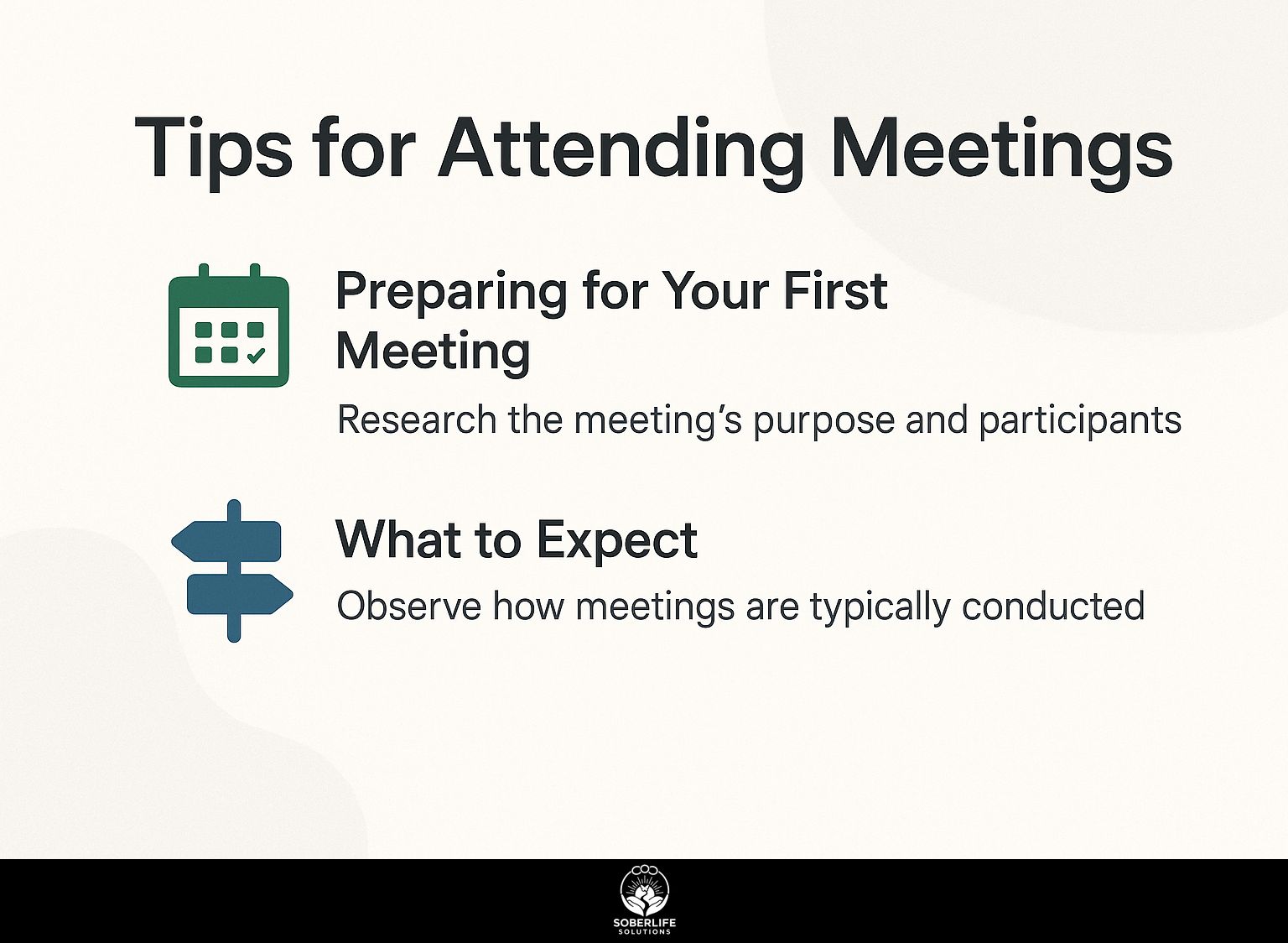
Going to A.A. meetings can change your life, and being ready can make your involvement more beneficial. For those looking to streamline their participation, the AA Meetings Directory offers a valuable resource to locate the most suitable gatherings.
Preparing for Your First Meeting
Getting ready for your first A.A. meeting can help reduce nervousness and improve your experience, supporting a better recovery process.
Begin by reading “The Big Book,” which offers an overview of the A.A. philosophy and personal stories that might connect with you. It’s also helpful to note the meeting details-time and location-so you feel confident attending.
Think about inviting a friend who knows what you are going through; having them with you can make you feel at ease. When introducing yourself, keep it simple: share your first name and let others know you’re new. This openness encourages others to engage, helping you share your experiences later.
What to Expect
Knowing what happens at an A.A. meeting can ease worries and help new members participate better.
Typically, A.A. meetings follow a structured format that includes a welcome, reading of the chairperson’s guidelines, and sharing personal stories. Joining activities encourages respect because everyone’s experience is important.
It’s also essential to maintain confidentiality-what is shared in the room stays in the room. Newcomers should focus on listening, but when ready to share, it’s helpful to keep comments brief and to the point.
Most meetings take about an hour, allowing newcomers to see how the group works together to support recovery.
Additional Resources
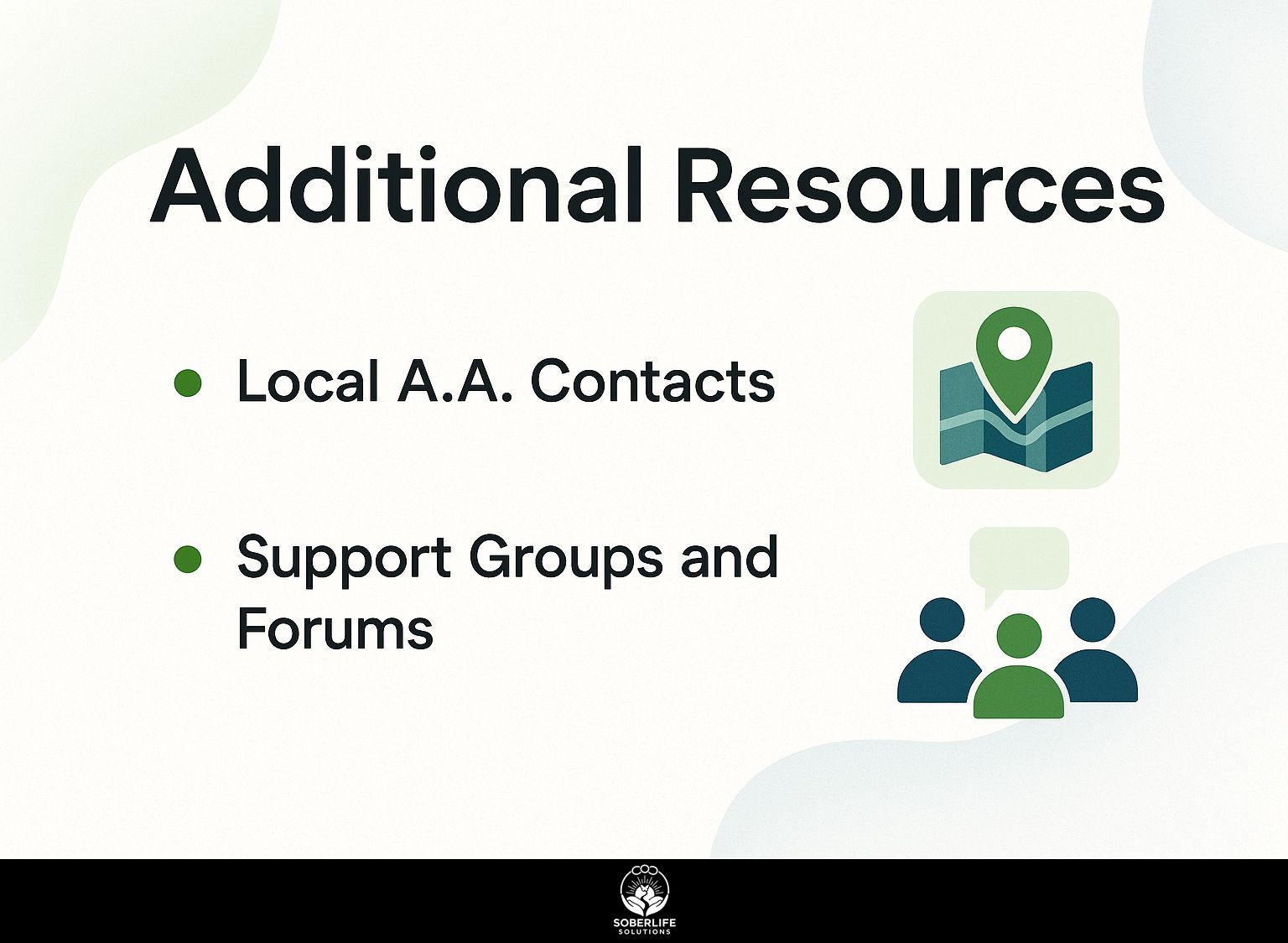
Besides meetings, people can find tools that help with recovery. This includes local contacts and online support groups. If you’re interested in expanding your support network, consider exploring the Online Intergroup: Definition, Benefits, and How to Join, which can provide valuable resources and connections.
Local A.A. Contacts
Reaching out to local A.A. contacts can give important help and details about nearby meetings and available resources.
To find local A.A. contact information, start by visiting the official Alcoholics Anonymous website, which lists intergroup and district directories by state. You can also call national helplines, such as the A.A. Central Office at 1-800-662-HELP, for immediate support.
Visiting local intergroup websites is important because they regularly share information on meetings, events, and tools. Creating a local support network helps build relationships and responsibility. You might attend some meetings to meet others and learn about more outreach opportunities.
Support Groups and Forums
Support groups and online forums are important parts of A.A., providing more ways to share experiences and find community support.
Two important online resources are the A.A. Grapevine forum and various Facebook support groups focused on sobriety.
The A.A. Grapevine provides a place where members can share their stories and thoughts in discussion threads and articles, creating a feeling of community.
On Facebook, groups like ‘Sober Support’ provide a daily platform for encouragement and advice, allowing members to connect globally.
These forums support active involvement, helping people form connections and remain responsible as they work on their recovery.
Frequently Asked Questions
What is the purpose of the Finding A.A. Meetings with Flexible Scheduling Resource Guide?
The resource guide was made to help people dealing with alcoholism find A.A. meetings with flexible times, making it easier for them to attend and get support for their recovery.
What types of A.A. meetings are included in the Resource Guide?
The Resource Guide includes a variety of A.A. meetings, such as open meetings, closed meetings, speaker meetings, and step meetings. All of these meeting types offer different formats and atmospheres, allowing individuals to choose what works best for them.
How can I access the Finding A.A. Meetings with Flexible Scheduling Resource Guide?
The Resource Guide can be accessed online through various A.A. websites, or physical copies can be obtained at local A.A. groups or through A.A. hotlines. Some addiction treatment centers may offer the Resource Guide to their clients.
Can I attend A.A. meetings if I am not an alcoholic?
Yes, A.A. meetings are open to anyone who has a desire to stop drinking. Non-alcoholics can attend as observers or to support a loved one who is struggling with alcoholism.
Are there any fees for attending A.A. meetings listed in the Resource Guide?
No, all A.A. meetings listed in the Resource Guide are free of charge. A.A. is a self-supporting organization and donations are accepted, but not required.
What if I cannot find a meeting with flexible scheduling in my area?
If you are having difficulty finding a meeting with flexible scheduling in your area, call your local A.A. hotline or contact the A.A. General Service Office for help. They may be able to provide you with additional resources or help you start a new meeting in your area.


